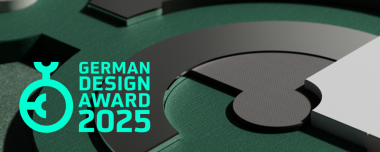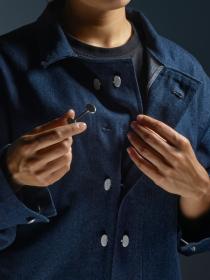German Design Award 2025: Internationaler Ausschreibungsstart
Unternehmen, Designer*innen, Architekt*innen und Agenturen sind ab sofort weltweit dazu aufgerufen, ihre Produkte und Projekte zum German Design Award 2025 einzureichen. Der German Design Award des Rat für Formgebung prämiert Projekte, die in der deutschen und internationalen Designlandschaft wegweisend sind und hebt positive Entwicklungen im Circular Design hervor. Die Auszeichnung macht den Erfolg nicht nur sichtbar, sondern eröffnet den Preisträger*innen ein Netzwerk, internationale Reichweite und zusätzliche Marktchancen. Anmeldeschluss ist der 6. September 2024.
Ob Digitalisierung, KI oder Circular Design – auf der Plattform des German Design Award wird sichtbar, welchen Beitrag Design zur nachhaltigen Transformation der Wirtschaft leisten kann. Denn herausragendes Design kann heute mehr denn je Antworten auf die Herausforderungen unserer Zeit geben, die die Auswirkung von Produkten und Services auf den Planeten und unsere Gesellschaft in den Mittelpunkt stellen – durch multiperspektivische Ansätze, nachhaltige wie zirkuläre Designprozesse oder ressourcen- und umweltschonende Produktion. Der German Design Award hat es sich zum Ziel gesetzt, die vielfältigen Transformationsaufgaben unserer Zeit durch Design zu fördern und durch herausragende Beispiele Orientierung für andere zu geben.
Fokus auf Circular Design
Ab diesem Jahr können Unternehmen und Designer*innen ihre Projekte in der Zusatzkategorie „Circular
Design“ einreichen. Hier werden besonders innovative Lösungen sichtbar, die die aktuellen Zielsetzungen der Kreislaufwirtschaft in die Umsetzung bringen und inspirierende Impulse setzen.
Die internationale Jury des German Design Award zeichnet diese Designleistungen in drei Hauptkategorien „Excellent Product Design“, „Excellent Communications Design“ und „Excellent Architecture“aus.
Neue Kategorie
Um zukunftsweisende Entwicklungen in der Architektur durch den Einfluss von künstlicher Intelligenz und digitale Gestaltungsmethoden sichtbar zu machen, können Gestalter*innen und Entwickler*innen ab diesem Jahr Projekte, Service Designs und virtuelle Architekturen in der Kategorie „AI in Architecture and Metaverse Space Design“ einreichen.
Zugang zum amerikanischen Markt
Der Rat für Formgebung hat eine TV-Partnerschaft mit der neuen US-Dokureihe Europe ByDesign von CBS/Paramount geschlossen und bietet den Preisträger*innen des German Design Award damit Chancen, sich auf dem US-amerikanischen Markt zu positionieren. Sie können Ihre Arbeit in der nächsten Staffel von Europe ByDesign vorstellen, die zur Hauptsendezeit auf CBS in den USA als auch im weltweiten Streaming ausgestrahlt wird.
Wichtige Daten im Überblick
- Ausschreibungsstart: 23. April 2024
- Anmeldung zum Early Bird-Preis: bis 21. Juni 2024
- Deadline für Förderanträge: 30. August 2024
- Anmeldeschluss: 6. September 2024
- Jurysitzung: 26. & 27. September 2024
- Award Show: Anfang Februar 2025
German Design Council Foundation - Rat für Formgebung

















